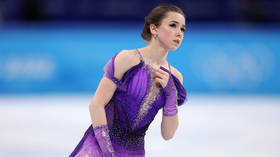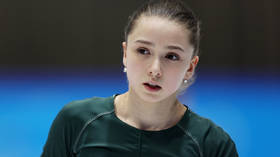IOC official ‘surprised’ amid calls for total Russia ban

International Olympic Committee (IOC) executive board member Denis Oswald has responded to suggestions that Russian figure skater Kamila Valieva is somehow involved in a 'state-sponsored' doping program, backing the IOC's handling of the situation amid the ongoing saga in Beijing.
Valieva, 15, became central to a media firestorm when it was announced that she had tested positive for a banned heart medication in a sample taken in December. A ruling from the Court of Arbitration for Sport (CAS) on Monday determined that the teenager should continue to be eligible to compete at the Winter Games.
IOC official Oswald was pressed on the issue during a media conference on Tuesday, where he was asked about past accusations that Russia was involved in a strategic doping campaign at the 2014 Sochi Olympics – something Russia has repeatedly refuted.
Oswald previously chaired a disciplinary commission investigating past doping claims.
“It is not established that there is a relation between this [Valieva] case and the doping state of 2014,” Oswald told reporters.
“It seems to have no connection between the two.
“No such connection has been established so far. Do you have a country in the world where there is no single case of doping?
“I don’t think you have, no country is perfect. It is not the result of what we have done since 2014.”
Oswald added that any disciplinary measures taken by the IOC must only target athletes proved to have been purposely involved in cheating, and that clean athletes, regardless of who they represent, must have their right to compete preserved and protected.
“We cannot punish clean athletes, that is what we tried to do,” Oswald added, referring back to sanctions imposed by the IOC and WADA against Russian athletes.
“In 2017 we did the maximum we could do according to the law. The sanction, whichever sanction you take, it must be proportionate to the offence.
“We took the maximum punishment we could do in law. We suspended the athletes involved for the next two Games and this was overturned by the court, saying this is not proportionate to the offense.
“They limited the sanction, it was limited from one Olympic Games rather than two. We live in a state of law and we have respected the law.”
Valieva's case has seen increasingly hysterical calls for further sanctions on Russian athletes from some media figures, even though the facts of the case are still being established.
USA Today columnist Christine Brennan has called for a blanket ban on Russia at both the 2024 Olympics in Paris and the next Winter Games in Milan in 2026.
Responding to Oswald, she also claimed: "Just once, wouldn’t it be great if some IOC leader at a press conference said what the rest of the world knows: that Russia’s obsession with cheating has plunged another Olympics into chaos, potentially ruining the experience for dozens of innocent athletes?"
Getting ready for @CNNSitRoom to talk Kamila Valieva and Russian doping. When people ask how to clean this up, here’s the first thing that should be done: Ban Russia from the 2024 Paris Olympics and 2026 Milan Olympics. Make them pay for the chaos they have caused. pic.twitter.com/zAsJN0Ki0q
— Christine Brennan (@cbrennansports) February 14, 2022
Similar outrage has appeared on the pages of Yahoo Sport, where writer Dan Wetzel claimed that the official response to Valieva and her positive test has “cleared the way for Russia to cheat forever.”
But as Oswald noted in his comments to the media, “it is surprising that people from all over the world have opinions and comment on the case where we ourselves [the IOC] don’t know the details."
Russian officials, including at the national Olympic committee and figure skating federation, have maintained their belief that Valieva is innocent.
The ROC noted that Valieva repeatedly passed doping tests before and after her positive result, which was taken at the Russian national championships on December 25.
Questions have also been raised as to why it took so long for the WADA-accredited laboratory in Sweden to report the test result, which only arrived after Valieva had helped the ROC to the gold medal in the team event in Beijing.
Oswald revealed on Tuesday that Valieva's team said her positive test for the banned heart drug trimetazidine may have come via accidental contamination from medication her grandfather was taking.













